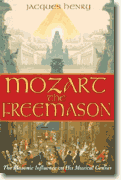Mozart the Freemason
Jacques Henry
book reviews:
· general fiction
· chick lit/romance
· sci-fi/fantasy
· graphic novels
· nonfiction
· audio books
· author interviews
· children's books @
curledupkids.com
· DVD reviews @
curledupdvd.com
newsletter
win books
buy online
links
home
for authors
& publishers
for reviewers

 |
Mozart the Freemason: The Masonic Influence on His Musical Genius Jacques Henry Inner Traditions Paperback 160 pages September 2006 |
|
Wolfgang Mozart was a Freemason. This is historical fact. There have been many famous people associated with Freemasonry, arguably nearly all of the American founding fathers (arguable because the Freemasons are still a secret society), but for such a small, though worldwide, cult, claiming Mozart is a rather large feather in a rather modest cap.
Author Henry asserts that, beyond the Mozart compositions known to have had Masonic influence (The Magic Flute is a prime example), there are other, lesser-known works that draw from Masonic symbols, such as the triads like the three flats in the key of E-flat Major (e g, Divertimiento in E Flat Major known as the “Puchberg Trio,” and the Quintet for Strings written in 1791, not long before Mozart’s death). Mozart was a willing and proud member of the Freemasons, but it has been speculated elsewhere that the typical member of this secret sect was prosperous, where Mozart was not. Puchberg, above, references not a town as might be supposed, but a generous Masonic patron. It is within possibility that Mozart needed the Masons more than they needed him. Freemasonry was an underground movement espousing dangerously egalitarian ideals at a time when monarchy was teetering in places like France and had fallen forever in the Americas. It was philosophically and politically neutral, though its very existence vied with entrenched authority. One thing it was not, and Mozart was: sensual. Mozart was sexually zealous to the point of kinkiness. It’s hard to believe he took his Freemasonry into the bedchamber, where he spent a lot of time. This book allows us to imagine that while writing, for example, the Quintet for Strings in E-Flat Major, Mozart “was able to overcome his anguish. His spiritual strength was drawn in large measure on his Masonic ideal and remained comforted by the encouragement of his brothers.” The “brothers” mentioned in this context were his Masonic cohorts. The statement is simple speculation, as is the author’s belief that Mozart wrote his Masonic Cantata as the piece that would fill in the missing segments of his great Requiem because “an identical inspiration underlies both works.” According to scholar/biographer Peter Gay (Mozart: A Life, reviewed elsewhere in Curled Up With a Good Book), Mozart in his final year “wrote two operas, a piano concerto, a large number of minuets and counterdances, a clarinet concerto, a Masonic cantata, two quintets, and most of the Requiem.” Gay does not draw the sub rosa connecting line between the gap in the Requiem and length and “identical inspiration” of the cantata. Because critics and fans of Mozart may be Freemasons doesn’t give them the right to co-opt his compositions without historical basis. Henry’s book will be of interest to Freemasons but to few others, despite his credentials and his painstaking efforts to make the linkages between Mozart the composer/musician and Mozart the Freemason. Originally published on Curled Up With A Good Book at www.curledup.com. © Barbara Bamberger Scott, 2006 |
|
|
|
 Click here to learn more about this month's sponsor! |
|
| fiction · sf/f · comic books · nonfiction · audio newsletter · free book contest · buy books online review index · links · · authors & publishers reviewers |
|
| site by ELBO Computing Resources, Inc. | |
 The author of this book, Jacques Henry, is both music expert and Mozart fan, the artistic director, in fact, of an annual Mozart festival in France. He is also a Freemason, making no secret of that affiliation. Had he not avowed it, it would still be hard for a reader to escape the conclusion, as who else would have such an insider’s understanding of the symbolism of Mozart’s music within the arcana of Freemasonry?
The author of this book, Jacques Henry, is both music expert and Mozart fan, the artistic director, in fact, of an annual Mozart festival in France. He is also a Freemason, making no secret of that affiliation. Had he not avowed it, it would still be hard for a reader to escape the conclusion, as who else would have such an insider’s understanding of the symbolism of Mozart’s music within the arcana of Freemasonry?